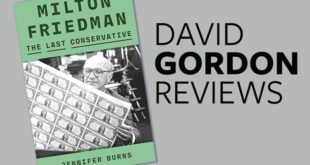Some philosophers, drawing upon Immanuel Kant’s Critique of Pure Reason, have questioned the nature and limits of reason. By contrast, human reason plays a central role in libertarian thought. In the ordinary dictionary sense, human reason means simply “the ability of a healthy mind to think and make judgments, especially based on practical facts.”In Human Action, Ludwig von Mises depicts reason as a universal quality common to all human beings, emphasizing that...
Read More »The Last Conservative
Milton Friedman: The Last ConservativeBy Jennifer BurnsFarrar, Straus and Giroux, 2023; x + 587 pp.Imagine that you come across this about the “education premium” on someone’s blog: “By going to college, you are more than tripling your chances for success in after life.” The statement is buttressed by a calculation of the extra lifetime earnings that a college degree will provide. Wouldn’t you think that the author is an economist? In fact, the author was a high...
Read More »Creative Destruction in American Higher Education: Schumpeter in Action
Joseph Schumpeter (1883–1960), an Austrian political economist who emigrated to the United States in 1932 to become a professor at Harvard University, is known for his theories on business cycles and entrepreneurship.He is perhaps best known for advancing the concept of “creative destruction,” which he defined as the natural process of business firms failing at some point, freeing up resources (land, labor, and capital) that can then become more productive in some...
Read More »Joseph Stiglitz’s Rocky Road to Serfdom
The Road to Freedom: Economics and the Good Societyby Joseph E. StiglitzW.W. Norton, 2023; 356 pp.To say that Joseph Stiglitz, a Nobel Prize winner in economics who now teaches at Columbia University, opposes the free market is an understatement. He does not favor complete central planning, he tells us, but wants a balance between market and nonmarket arrangements. However, when it comes to his concrete proposals, the market seems always in his eyes to be deficient....
Read More »Calmer Markets Ahead of the Weekend
Overview: The dollar is paring yesterday's advance that was spurred by the rise in US rates following the preliminary PMI, which reached its best level in two years. The survey also picked up higher prices. The dollar is in narrow trading ranges but softer against nearly all the G10 currencies today. The Swiss franc and Japanese yen are laggards. Despite a large disappointing miss on UK retail sales, sterling has steadied after falling yesterday for the first time...
Read More »Garett Jones on the Economic Impact of Culture on Immigration
What is the Mises Institute? The Mises Institute is a non-profit organization that exists to promote teaching and research in the Austrian School of economics, individual freedom, honest history, and international peace, in the tradition of Ludwig von Mises and Murray N. Rothbard. Non-political, non-partisan, and non-PC, we advocate a radical shift in the intellectual climate, away from statism and toward a private property order....
Read More »Roaring Kitty vs. Chairman Powell
Stock market technicians are musing that if meme stocks are surging the Fed is not tight enough. Yes, after three years of hibernation “Roaring Kitty” returned with the first of a series of cryptic posts on X. Keith Gill’s (aka Roaring Kitty) post showed a man leaning forward with what looked like a gaming controller. Some traders interpreted it to mean Gill is coming back, according to Bloomberg. Gill rallied day traders on Reddit in an effort to squeeze GameStop...
Read More »The Consequences of California’s New Minimum Wage Law
The law that establishes California’s minimum wage rate at twenty dollars per hour is purportedly aimed at uplifting the state’s working poor. The role of economics is to evaluate such claims through economic theory and empirical evidence. In mainstream economics, commonly taught in introductory college courses, the conventional analysis indicates that such laws may lead to heightened unemployment only if the new minimum wage exceeds the market wage. While this...
Read More »Memorial Day
It’s that time of year again. The first military appreciation day of the year, otherwise known as Memorial Day, is coming up on Monday, May 27.On the Sunday before this day, many conservative, evangelical, and fundamentalist churches will have patriotic services where American flags are placed all over the church grounds and inside the building, the congregation recites the Pledge of Allegiance, hymns of worship to the state will be sung (including the blasphemous...
Read More »Doctor Copper Is Sending Signals Our Way
The price of copper has hit an all-time high. This represents a signal about the world economy. The euphemism on Wall Street for the implications of the price of copper is called Doctor Copper.If the price of copper is moving higher, then Doctor Copper is diagnosing economic growth, or possibly an artificial economic boom. If the price of copper is moving lower, then Doctor Copper will diagnose an economic contraction, or economic bust, or even an economic crisis,...
Read More » Swiss Economicblogs.org
Swiss Economicblogs.org


